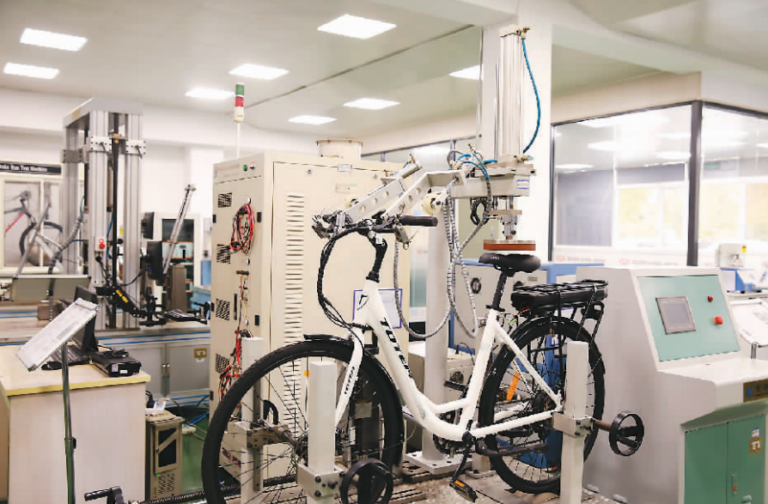
By Kang Pu
China’s bicycle exports have maintained robust growth in the past two years. The country sold 69.26 million bicycles to foreign destinations last year, up 14.9 percent year on year, and the export value surged 40.2 percent from a year ago to nearly $5.11 billion, according to customs data.
“We exported about four million bicycles last year, which accounted for 30 percent of our company’s total production,” said Sheng Kai, business manager of Shanghai Phoenix Import & Export Co., Ltd., a subsidiary of century-old bike-maker Shanghai Phoenix Enterprise (Group) Co. Ltd. (Shanghai Phoenix). According to him, the production schedule of the company has been made full in the first half of this year.
“Although influenced by the pandemic, we stood at a new starting point in 2021 in terms of export. Now our high-end products will be sought after, and the orders will keep coming in,” the manager said. Two mergers and acquisitions in Tianjin in 2020 have doubled the company’s exports, he added.
The established bike producer reported outstanding performance in its sales to developed countries, and 64 percent of its total exports went to Europe, the U.S., and Japan.
Tianjin Golden Wheel Group in north China’s Tianjin municipality also had a bumper year. Its sales revenue hit 5 billion yuan (about $786 million) last year, up from 3.1 billion in 2020, said Yang Yufeng, general manager of the group.

He said almost all the 250,000 electric bicycles and 2 million bicycles manufactured by the group have contributed to its exports, adding that the group has a sales network that covers over 120 countries and regions.
More people are riding bicycles for commuting and fitness amid the COVID-19 pandemic, as it is considered safer and healthier, said an insider. Some countries are offering subsidies on bicycles, which has placed a high demand on vehicles. Bicycles are even in short supply in some European countries and the U.S.
“For overseas bicycle markets, especially the high-end markets, bicycle brands’ popularity, production capacity, sales channels, and client resources are very important. Only those that are great in all these aspects can gain a foothold and grow in overseas markets,” Sheng said.
Apart from the soaring exports of finished bicycles, vast Chinese-made bike parts are shipped to overseas destinations, too.
Liu Chunsheng, general manager and founder of L-TWOO, a Chinese high-tech enterprise specializing in the design and production of bicycle drive-train components, has been kept busy recently.
“The pandemic has caused delays of delivery for U.S. and Japanese producers of bicycle transmissions, and some of them have extended their delivery cycle to two years,” Liu said, adding that his company has been seeing increasingly more orders as it can deliver orders within a month.
Thanks to its premium quality and shorter delivery cycle, L-TWOO has become suppliers of not only domestic bicycle producers, but also international big names.
China has made huge progress in the research and innovation of core bicycle parts, said Guo Wenyu, secretary-general of the China Bicycle Association.
Domestic suppliers, which enhanced the capacity of the industry under the impacts of COVID-19, have played a positive role in maintaining the healthy development of the industry, Guo noted.
It’s notable that the growth in the value of bicycle exports has outnumbered that in the quantity, which suggests the increasing the price of exported bicycles. The exports of high-value-added vehicles, including road bikes, mountain bikes, and electric bikes, are all on rapid growth.
Behind the increasing unit price are the efforts made by Chinese bike producers to grab a share in the medium and high end of the industrial chain, which calls for great perception in the market and progress in independent R&D capability.
At present, electric bikes powered by motors and lithium batteries are a major trend in the European bicycle market. Last year, Shanghai Phoenix established a high-standard lithium battery R&D and testing center to expand its product lining. So far, it has developed three major series of electric bicycles for mountain biking, urban riding, and special functions.
Transmission, considered the “heart” of a bike, is also the most profitable part. Solid patent barriers have long been built by leading transmission manufacturers to protect their position in the market.
To avoid these barriers and refine its products, L-TWOO has spent more than three years building its own technologies. Now the company is the third-largest patent owner globally in the bicycle industry. It has developed more than 200 types of transmissions and is able to produce 200,000 sets on a monthly basis, serving over 200 clients around the world.










